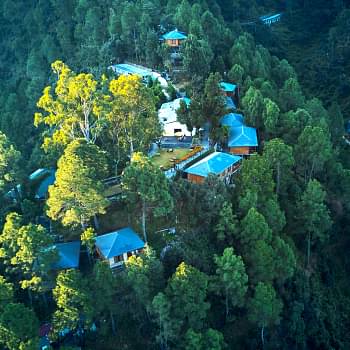February 01, 2020
Make this World Wildlife Day an excuse to travel to these rich Indian reserves

Revati Nargund


View all
140+
Resorts
February 01, 2020

Revati Nargund
The impact of human activity has changed the world we live in. We are unlikely to ever see many species again, as they are either extinct or on the brink of extinction. Natural phenomena play a part in some extinction events, but that’s usually attributed to species being unable to adapt to changing environments. Human pursuits such as hunting for pleasure, poaching, encroaching on natural habitats, deforestation, and mining are responsible for localised extinctions, but the one aspect that has an impact across the globe is climate change.
Of course, climate change has its share of deniers, but scientific research over the past four decades has put the blame squarely on our shoulders. So it may seem ironic that the very species responsible for this wanton destruction is creating ‘safe’ areas – national parks, wildlife sanctuaries, nature reserves, and biodiversity zones – in a bid to preserve what used to flourish before humans began to walk the earth.
In December 2013 the United Nations General Assembly (UNGA) declared March 3 as UN World Wildlife Day. The aim is to celebrate and raise awareness of the world’s wild animals and plants. World Wildlife Day has now become the most important annual global event dedicated to wildlife, and the theme for 2018 is Big Cats: Predators Under Threat.
Big cats are feared and admired in equal measure across the globe. While the term is mostly associated with the lion, tiger, leopard, and jaguar, the definition has been expanded to include the cheetah, snow leopard, puma, and clouded leopard as well.
Over the past century, we have lost the planet’s most majestic predators at an alarming rate. Most of this loss has been caused by human activity. According to the UN, tiger populations have plunged 95 percent in the past 100 years, and that of African lions by 40 percent in just 20 years.
World Wildlife Day 2018 provides an opportunity to raise awareness and garner support for global and national initiatives to save these iconic species. Through big cats, the hope is to generate attention, involvement, and action to ensure they are around for a long time – not only for us and our children, but for future generations to enjoy.
António Guterres, Secretary General of the United Nations, said, “On World Wildlife Day, I call on people around the world to help raise awareness and to take personal action to help ensure the survival of the world’s big cats and all its precious and fragile biological diversity”.
We must also recognise the lifelong efforts by those passionate about protecting and preserving wild fauna and flora. More importantly, we must remind ourselves – and those around us – of the need to step up the fight against poaching, wildlife crime, and human-induced reduction of species, all of which impact us economically, environmentally, and socially.
Countries around the world, including India, have identified and preserved vast areas of their respective nations – including oceans and seas – as ‘safe’ zones. Visitors to these areas may see it as an adventure safari. No doubt it is; but there is a greater purpose. So when you visit a wildlife reserve, do enjoy Nature in all her glory, but respectfully.
According to figures published in January 2018 by the Wildlife Institute of India, just over 7 lakh sq km (21.34 percent) of India is covered by forests. There are 769 protected areas measuring 1.62 lakh sq km, which amounts to 4.93 percent of the country’s area. There are 103 National Parks and 544 Wildlife Sanctuaries, of which some of the best-known are:
• Corbett National Park, Uttarakhand
• Ranthambore National Park, Rajasthan
• Kaziranga National Park, Assam
• Sariska National Park, Rajasthan
• Khangchendzonga National Park, Sikkim
• Sunderbans National Park, West Bengal
• Nagarhole National Park, Karnataka
• Kanha National Park, Madhya Pradesh
• Gir National Park, Gujarat
• Periyar National Park, Kerala
• The Great Himalayan National Park, Himachal Pradesh
• Tadoba Andhari Tiger Reserve, Maharashtra
• Bandhavgarh National Park, Madhya Pradesh
• Nanda Devi Biosphere Reserve, Uttarakhand
The list above is but a small but significant glimpse of preserved areas that cover the length and breadth of India. Some are famous the world over, while others are still relatively unexplored. Some are known for their fauna, others for their flora. The scope of wildlife is so vast that it is almost impossible to cover them in detail. It’s far better to visit and experience it for yourself.
However, the species that enthral everyone are the big cats. The majestic Bengal tigers and the elusive leopards lord it over many areas, while the lions of the Gir Forest and the shy and mysterious Himalayan snow leopards are small in number and limited in geographical reach.
Visiting one or more of India’s great natural reserves can be an end in itself, but the means to the end is made easier and more comfortable by the presence of Club Mahindra resorts in many of these pristine areas. Built with your comfort in mind and impeccably maintained, ensuring local tastes, sensibilities, food and culture, our resorts serve as a welcome rejuvenator after a long day spent exploring nature.
A tiger sighting, being relatively rare, is something that you can share and relive with friends and family for years to come. An elephant ride might just make you feel like a rajah of yore. The songs of myriad birds will keep you entertained. And if you wish for a moment of solitude, a spectacular sunset can be watched in silence.
If you decide to visit the oldest national park in India, Corbett, you can stay at a Club Mahindra resort. As you can when visiting Gir, Kanha, Nagarhole, Eravikulam, Periyar, Khangchendzonga, Machia, Jambughoda, Kudremukh, the Great Himalayan National Park, the Nanda Devi Biosphere Reserve, and even Mollem National Park in Goa.
So you don’t need an excuse – just a reason to visit, explore, and learn. And to be moved enough to explore someplace that’s different. But more importantly, to do your bit to encourage others to respect nature. Because nothing is more important than preserving our wildlife heritage for generations to come.
Mahindra Holidays & Resorts India Ltd. (MHRIL), a part of Leisure and Hospitality sector of the Mahindra Group, offers quality family holidays primarily through vacation ownership memberships and brings to the industry values such as reliability, trust and customer satisfaction. Started in 1996, the company's flagship brand ‘Club Mahindra’, today has over 300,000 members , who can holiday at 140+ resorts in India and abroad.
We use cookies to personalise content and to provide you with an improved user experience.By Continuing to browse this site you consent to the use of cookies.Please visit our cookie policy for further details.

Welcome to ClubMahindra.com In order to provide a personalised experience for you, we use cookies to enable some website functionality. Cookies help us see which articles most interest you; allow you to easily share articles on social media channels; permit us to deliver content personalised to your interests and locations; along with many other site benefits. For more information, please review our Cookie Policy
When you visit any website, it may store or retrieve information on your browser, mostly in the form of cookies. This information might be about you, your preferences or your device and is mostly used to make the site work as you expect it to. The information does not usually directly identify you, but it can give you a more personalized web experience. Because we respect your right to privacy, you can choose not to allow some types of cookies. Click on the different category headings to find out more and change our default settings. However, blocking some types of cookies may impact your experience of the site and the services we are able to offer.
Because we respect your right to privacy, you can choose not to allow some types of cookies and you have the right to withdraw your consent by send a mail to email id [email protected]
These cookies are essential in order to enable you to move around the site and use its features, such as accessing secure areas of the site. Without these cookies, services you have asked for cannot be provided.
These cookies allow us to employ data analytics so we can measure and improve the performance of our site and provide more relevant content to you. These cookies don't collect information that identifies a visitor down to an individual level that is available to us. These cookies are not passing personally identifiable information to any external third party other than in limited cases when we engage a service provider to act on our behalf but who is then unable to use the data for their own purposes.
Performance cookies are generally third-party cookies from vendors we work with or who work on our behalf that collect information about your visit and use of the Club Mahindra website, for instance which pages you visit the most often, and if you get error messages from web pages. These cookies don't collect information that identifies a visitor. All information these cookies collect is anonymous and is only used to improve your overall experience on how the website works. Third party vendors may have access to this data and may use it to improve their overall services and offerings.
Functionality cookies allow a site to remember choices you make (such as your user name, language or the region you are in) and provide more enhanced, personal features. These cookies cannot track your browsing activity on other websites. They don't gather any information about you that could be used for advertising or remembering where you've been on the Internet outside our site.
Third-party advertising and social media cookies are used to (1) deliver advertisements more relevant to you and your interests; (2) limit the number of times you see an advertisement; (3) help measure the effectiveness of the advertising campaign; and (4) understand people's behaviour after they view an advertisement. They are usually placed on behalf of advertising networks with the site operator's permission. They remember that you have visited a site and quite often they will be linked to site functionality provided by the other organization. This may impact the content and messages you see on other websites you visit. If you do not allow these cookies you may not be able to use or see certain these sharing tools content on our website.